Wondering when to move your baby to their own room? Learn the ideal age, signs your baby is ready, and expert tips for making the transition smooth and safe for everyone.
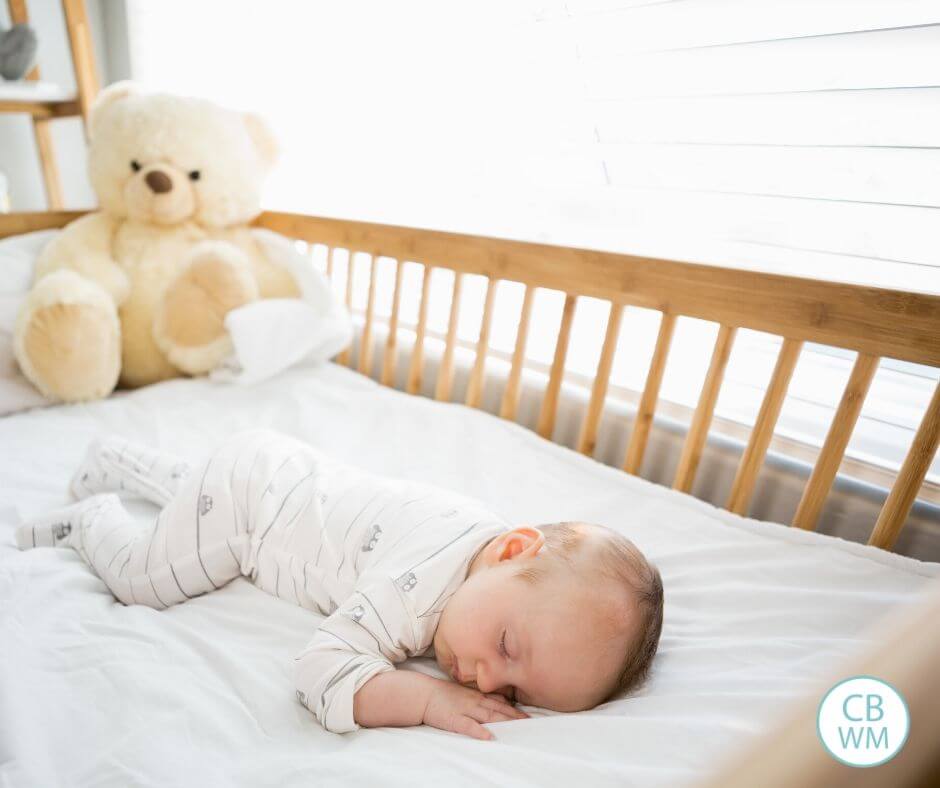
When you first bring your baby home from the hospital, you might not be able to imagine wanting your baby to sleep anywhere other than in your room as close to you as possible. It is common to have a baby sleeping in parents room.
As time goes on, however, baby still start to wake you up at night with all of her cute little noises she makes at night and you and/or your spouse will start to wake up your baby with all of the noises you make at night.
You realize everyone will sleep a little better with baby sleeping in own room.
As you ponder this, you might find yourself wondering when should you move baby into own room? Do babies sleep better in own room? How exactly should you go about putting baby in own room?
This post will cover when you should put baby in his own room, signs baby is ready to move to her own room, and tips for moving baby to own room.
Post Contents
- When To Move Baby To Own Room
- 6 Months Old
- 4 Months Old
- 3 Months Old
- Newborn
- When You Are Ready
- Signs Baby is Ready to Move to Own Room
- Number of Night Feedings
- Baby’s Mobility
- The Comfort of Baby
- Baby’s Awareness
- Doctor Recommendation
- Tips for Moving Baby to Own Room
- Have a Safe Sleep Environment
- Get Monitors for Peace of Mind
- Spend Time in the Nursery
- Have Baby Nap in Her Room
- Move the Bassinet into the Nursery
- Continue Your Sleep Routine
- Safe Sleep Guidelines
- Conclusion
- Related Posts
When To Move Baby To Own Room
The first big question is when. What age can baby go in his own room and sleep in his own space?
There is actually a fair amount of debate surrounding this question.
6 Months Old
The American Academy of Pediatrics (AAP) recommends babies sleep in the same room as their parents for at least the first 6 months of life, and ideally the first 12 months of life. They want baby in the same room but a separate bed. The reason for this recommendation is to reduce the risk of SIDS (sudden infant death syndrome).
“It is recommended that infants sleep in the parents’ room, close to the parents’ bed, but on a separate surface designed for infants, ideally for the first year of life, but at least for the first 6 months.” Read the full article here
The idea is room sharing with parents helps reduce SIDS because baby wakes more.
4 Months Old
Babies do not sleep as well when sharing a room with their parents as they do when they are in their own bedroom.
Studies find babies sleep much better and longer if they are in their own room by 4 months old. There are even some prominent pediatricians who question the recommendation to wait until 6-12 months.
“”It’s important for the Academy to have strong evidence and not just expert opinion to support our recommendations because these guidelines have such influence on practice and on parenting and child health,” Paul says. “One of the reasons we wanted to explore this is that the evidence is really weak for 6 to 12 months. I think in [the Academy’s] strong desire to prevent every single case of SIDS, they have looked at the data with a biased perspective.”” Read the full article here. It is very good if you are concerned about moving baby earlier than 6 months.
3 Months Old
There are many who recommend having your baby sleeping where you ultimately want baby to sleep by 3 months old. So if you want your baby to be sleeping in her own room and in a crib at one year old, you should have her sleeping there by 3 months of age.
This is good advice, but do not let it stress you out. Many babies, including my oldest, start out life sleeping in very different places than they sleep at one year old. Establishing habits early is fantastic, but babies are adaptable and can change.
Newborn
My last three babies were all moved to their own room when they were a newborn. If you feel comfortable at this age, it might also work for you. If you are ever unsure about decisions with your baby, it is always wise to consult your baby’s pediatrician.
If you are struggling sleeping with a young baby in the room but do not feel like baby is ready to move out, you can try sleeping with a white noise machine to help you and baby both sleep better with the noises of each other going on. This can help your newborn sleep better.
When You Are Ready
Ultimately, the best time to move baby to her own room is when you are ready and when you feel like your baby is ready. Always trust your intuition as a mom.
I share with you the recommendations so you have the knowledge of what experts have to say on the topic. Good information allows for good inspiration.
There are so many considerations when you are deciding when to move baby. What is best for your baby? What is best for you and your spouse? What arrangement will allow your baby to get enough sleep?
You have a whole family dynamic to consider with this decision. The whole family needs to be able to sleep.
I personally liked to move my babies to their own room as early as possible. With my oldest child, we were in the same room for the first 6 months just because we were living in a studio apartment type of situation. It was just one big room.
Finally, at six months old, we moved him to sleep in the bathroom. We all slept so much better after that! That is when he started to sleep through the night, and we all got better nighttime sleep.
With my second, I waited for a couple of weeks before moving her to her own room at night. With my next two babies, I got even shorter. My third was about a week old and my youngest was a few days old.
As soon as I felt good enough to move to the baby’s room in the middle of the night after delivering the baby, she was in her own room.
If you are struggling to sleep, or baby is not sleeping well sharing a room, but you feel like it is still best to share, try using a white noise machine in the room to help so you both don’t hear every tiny noise made.
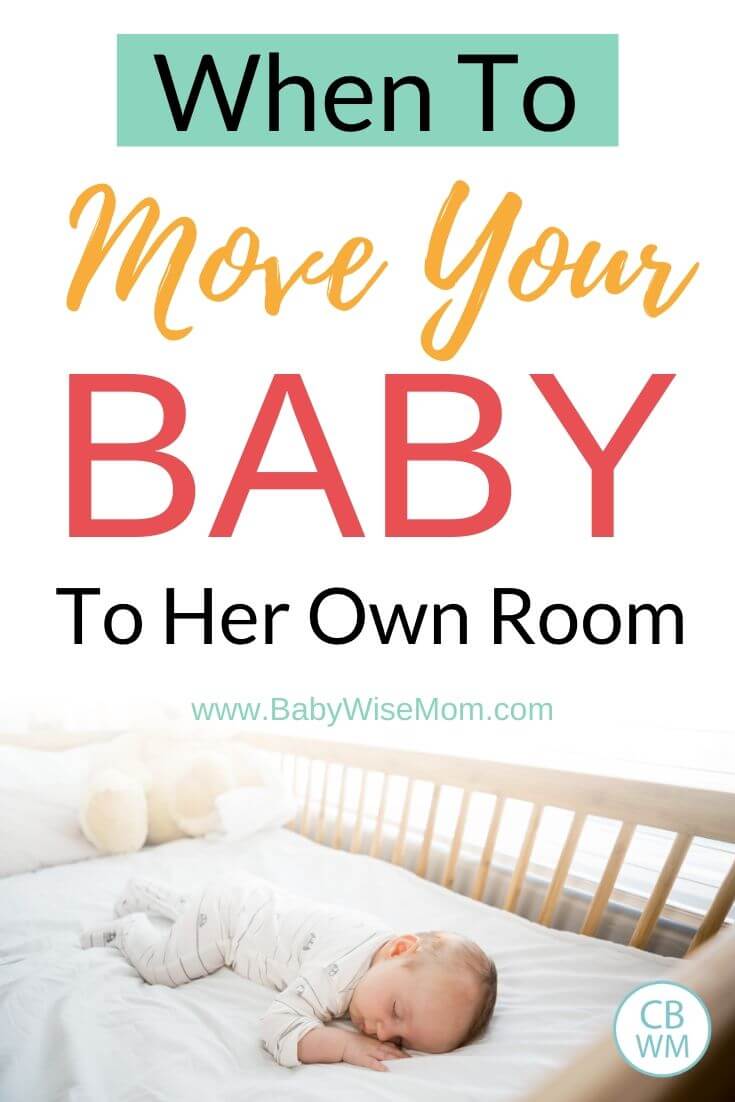
Signs Baby is Ready to Move to Own Room
If you are supposed to move baby when you are both ready, I bet you are wondering how you know if your baby is ready.
Number of Night Feedings
Take into consideration the number of night feedings. If your little one is eating every 2-3 hours through the night, it is much easier for you to just have your baby in the same room as you so you can easily feed baby and then go back to sleep.
I personally liked my baby to be at 1-2 night feedings before moving baby out of my room.
Many people do not even consider it until baby is sleeping through the night and taking no nighttime feedings. The trick with that is that baby might not sleep through the night until he is in his own room.
Your decision here will also be impacted depending on how close baby’s room is to your room. If baby is right next door, that might change your opinion than if baby was on a separate floor.
Baby’s Mobility
Once your baby can roll back and forth, the risk of SIDS decreases. You might feel much more comfortable with moving your baby to her own room once she can move around on her own.
As your baby can move around more, it isn’t always safe to leave a baby in a bassinet instead of sleeping in a crib.
The Comfort of Baby
Oftentimes, baby sleeping in parent’s room means the infant is in a bassinet of some sort. These get less comfortable for baby as they get bigger.
You might need to move baby into her own room simply so she can comfortably sleep in a crib.
Baby’s Awareness
As your baby gets older, she will become more aware of her surroundings. She will know you are right there and might want to party at night. Rather than sleeping through her transitions, she might wake up and want to socialize with you.
Even if she isn’t concerned about socializing, Dad’s snoring might wake her up fully and make it difficult for her to sleep.
Doctor Recommendation
It never hurts to consult with your baby’s doctor if you are unsure about the timing of this move. If you feel unsure about when to make the switch, talk to your baby’s doctor about it.
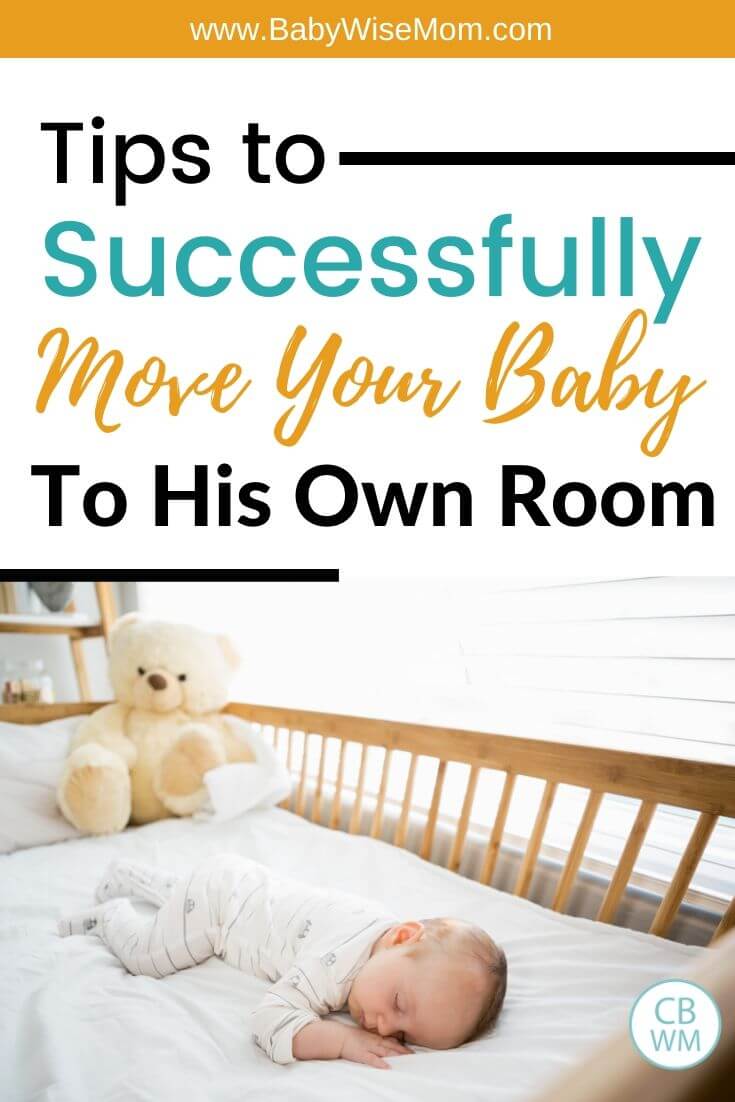
Tips for Moving Baby to Own Room
Once you have decided you are ready and your baby is ready, here are some tips for making the move to baby’s own room as smooth as possible.
Please note, some or all of these tips might be unnecessary for your baby. Your baby might move right to her own room with no fuss. It is worth seeing if that is true.
Have a Safe Sleep Environment
Have a safe sleep environment for your baby. This will help you have peace of mind and will, of course, keep your baby safe for sleep. Here are key points for safe sleep practices:
- Baby sleeps on her back
- Baby sleeps in her own bed
- No loose blankets, bedding, pillows, stuffed animals, bumpers, toys, etc. in the bed with baby. Use a fitted sheet only
- Firm crib mattress. You want a firm mattress for baby
- Crib is not near curtains, blind cords, or pictures
Get Monitors for Peace of Mind
You might also want a monitor for peace of mind. A video monitor is great for allowing you to see baby at any moment without disrupting baby’s sleep. We loved the Foscam security camera because we could monitor her through an app on our phones or on a desktop.
You might prefer an audio monitor so you can hear if something is off. I had video and a vTech so I had backup.
You might want to take it up a notch and use a monitor that tracks your baby’s movement, breathing, etc. A couple of popular ones are Owlet and the Angelcare Baby Monitor.
If you do not want a monitor for any reason, you can always leave baby’s door open and your door open.
Spend Time in the Nursery
If your baby needs time to adjust to new space, it is wise to spend time in the nursery before moving baby to sleep in there. Do diaper changes in there, get dressed in there, and do independent play in there.
Have Baby Nap in Her Room
The next step is to have your baby nap in the nursery. I often say take care of naps and the night will follow. If she is comfortable sleeping in the nursery for daytime naps, she will be fine to move in there at night. If possible, it is wise to have your baby sleep in the nursery for nap time as early and often as possible.
My second baby did half of her naps in my room and half in her room, and she always did fine moving back and forth. While she is flexible in general, I think this helped her be more flexible about sleeping wherever she needed to.
Move the Bassinet into the Nursery
If your baby is not comfortable sleeping in her crib, you can start by moving your bassinet into the nursery. If you have been using a portable crib, Moses basket, bassinet, etc, move that to the nursery so your little one is still in a familiar bed even though the room is unfamiliar. Once you are ready to transition baby into the crib, I have a post ready to walk you through getting baby to sleep in the crib.
>>>Read: 9 Effective Tips to Get Baby to Sleep in the Crib
Continue Your Sleep Routine
Continue your sleep routine you have used in the new room. This is a huge benefit of having a sleep routine; it indicates to baby that it is time to sleep, no matter where you are.
You can even do the bedtime routine in the nursery and then sleep in your room for a while as you get baby used to her own room.
You want to make sure you have a consistent bedtime routine each night so baby knows what to expect.
>>>Read: Sleep Routine Ideas to Get Your Baby Sleeping Well
Safe Sleep Guidelines
You always want to follow safe sleep practices to keep your baby safe while sleeping. The American Academy of Pediatrics (AAP) has the following recommendations to help avoid SIDS (Sudden Infant Death Syndrome):
- Place your infant on their back for sleep in their own sleep space with no other people.
- Use a crib, bassinet, or portable play yard with a firm, flat mattress and a fitting sheet. Avoid sleep on a couch or armchair or in a seating device, like a swing or car safety seat (except while riding in the car).
- Keep loose blankets, pillows, stuffed toys, bumpers, and other soft items out of the sleep space.
Conclusion
Always remember to trust your instincts and do what you feel most comfortable with as a parent. There is no one-size-fits-all. Once you are ready to move baby, follow these tips for a smooth transition!
Related Posts
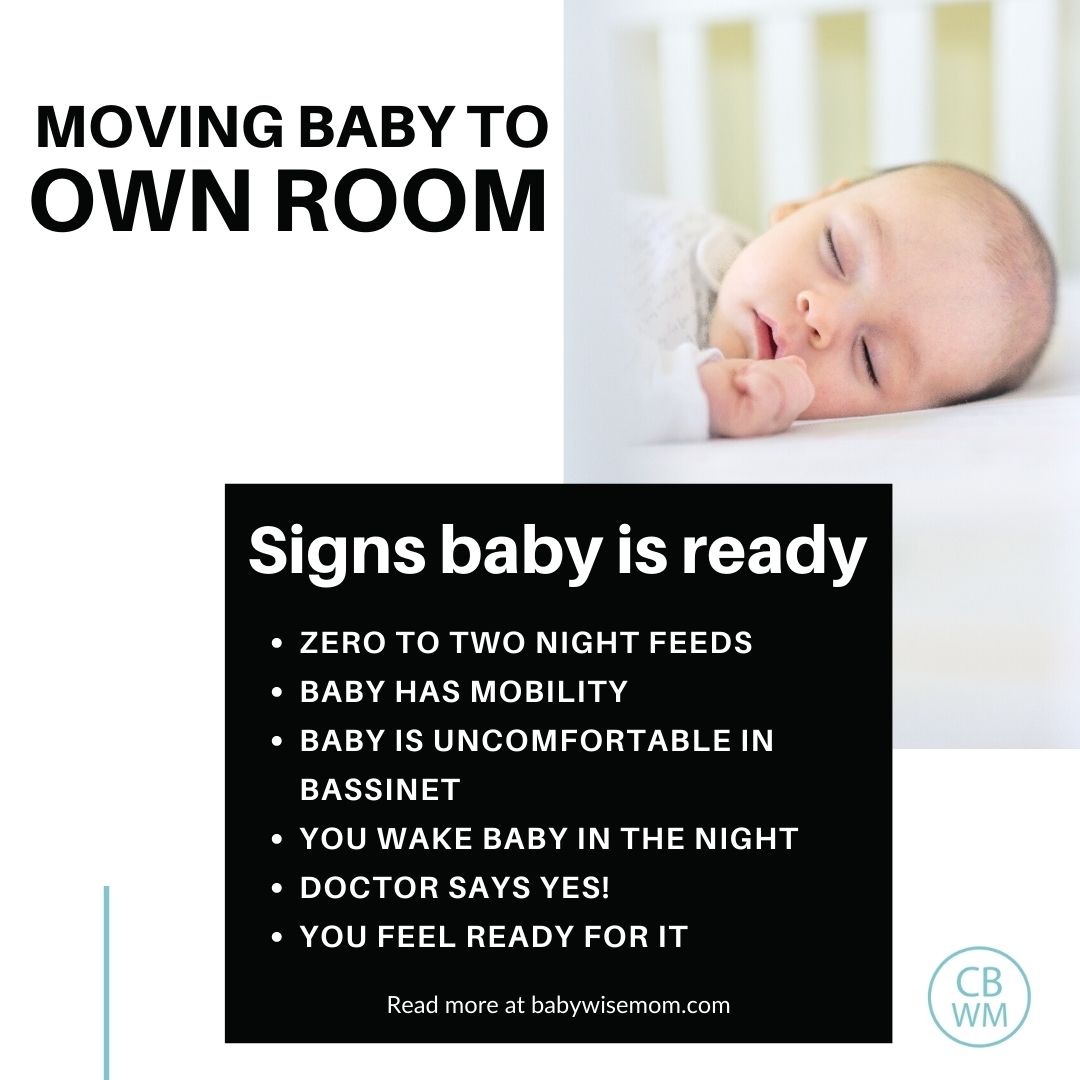
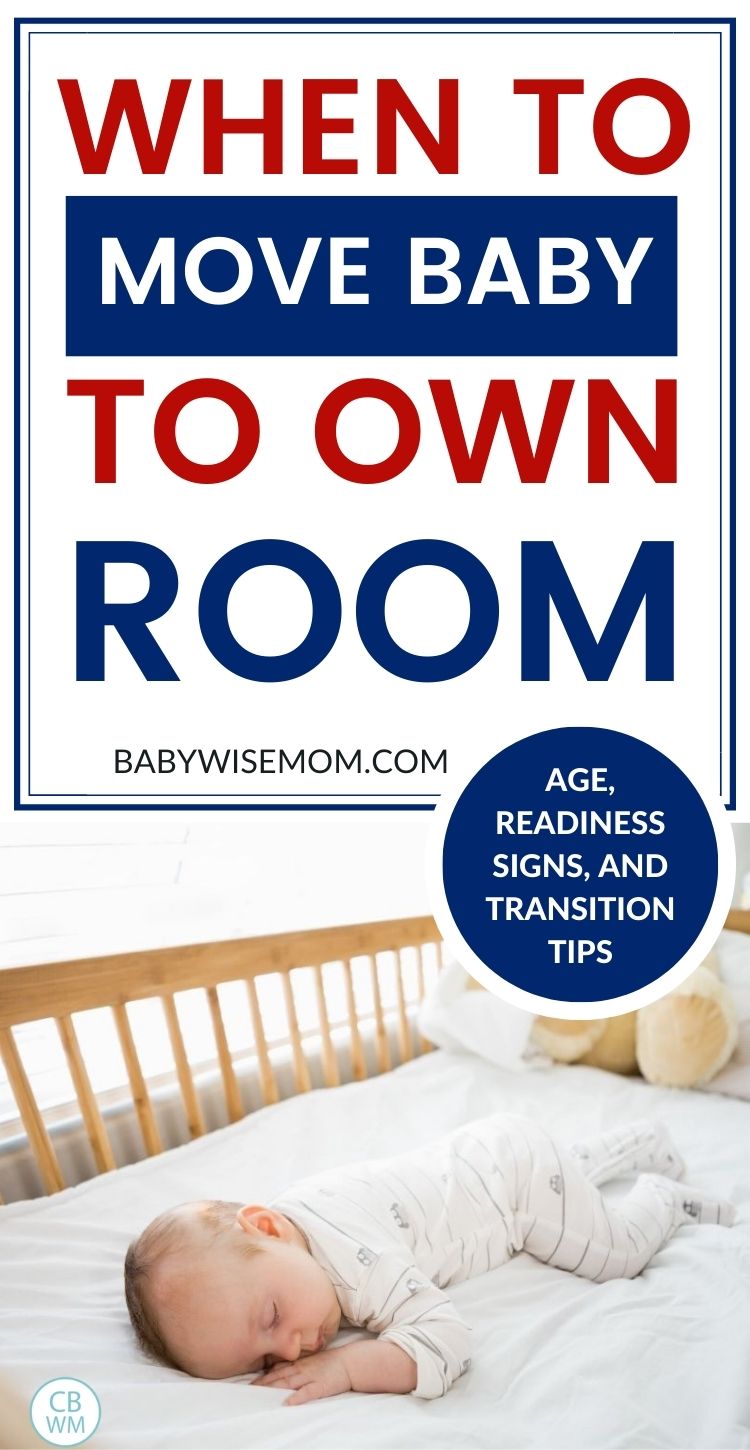
This post originally appeared on this blog in November 2019

With both of my kids, we moved them into their own room by 3 weeks old. I found that by this point, I was going completely insane over the constant night wakings (not every 1-2 hours, but CONSTANTLY). Meanwhile, they slept perfectly fine during the day. So all I did was put them in their own separate rooms at 3 weeks old. We did use a baby monitor obviously for safety reasons, though our house is so small that it is reasonably easy to tell if they are awake. This eliminated us hearing all of the constant small noises that they would make that would wake us up (and then in turn quite possibly wake them up).
The finding? Once they went into their own bedrooms, the dropped from CONSTANT night wakings to only 1-2 wakings a night. Of course, I would go and feed them when they woke up at night. But interestingly, it did not matter how they were fed. At that point, daughter was solely formula fed and son was still breastfed in the evenings and at night. He still dropped down to 2 feedings IMMEDIATELY while she dropped to 1 feeding the first night, then NO wakings at all the second night (sleeping 11-7, mind you… not 8-7 at first). I found moving them into their own bedrooms to be a sanity saver, and since we did it so early, they were used to their own bedrooms without any kind of adjustment period.
We plan to do the same with the third baby when he arrives in April.
I found it hard to sleep well with the baby making little noises all night long, too.
Moving my husband into a separate room meant that both our daughter and myself got better sleep. Go figure that the one that sleep talks and snores is the problem haha.
HAHA! So true.
How about siblings sleeping together? Any advice on that?
When to move baby out of our room to sleep with her older sister in a room
Yes good question! Here is a post on room sharing: https://www.babywisemom.com/room-sharing-9-tips/